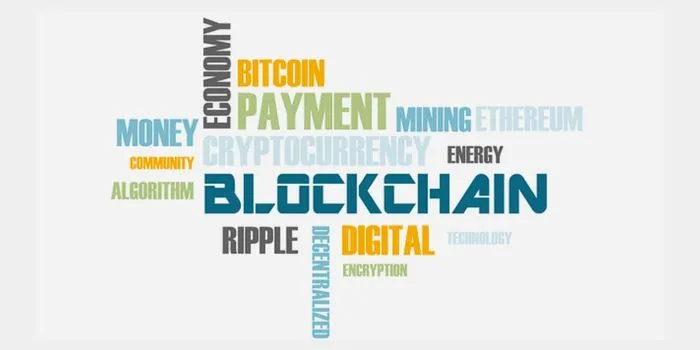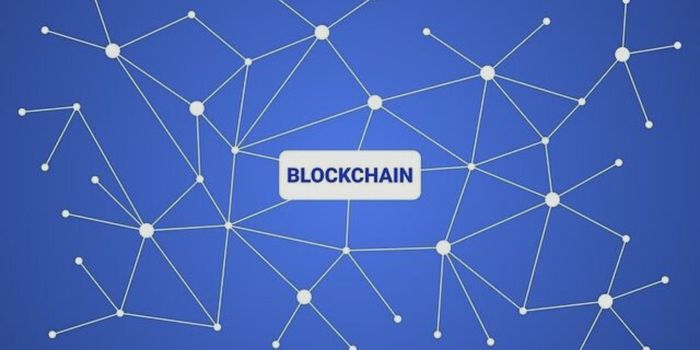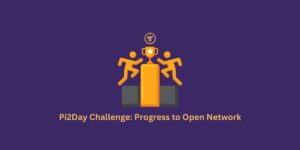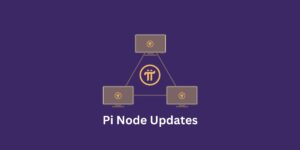Blockchain is a distributed digital ledger that contains any type of data at its core. Cryptocurrency transactions, NFT ownership, and DeFi smart contracts can all be recorded on a blockchain.
Introduction to blockchain
While any traditional database can hold this type of data, blockchain stands out because it is completely decentralized. Many identical copies of a blockchain database are held on various computers scattered across a network, rather than being maintained in one spot by a centralized administrator—think of an Excel spreadsheet or a bank database. Nodes are the individual computers that make up the network.
How blockchain Functions?
The name blockchain isn’t a coincidence: The digital ledger is frequently referred to as a “chain” comprising discrete “blocks” of data. A new “block” is formed and attached to the “chain” as new data is periodically added to the network. This entails all nodes updating their blockchain ledgers to the same version.
Why blockchain is considered highly safe is due to how these new blocks are formed. Before a new block can be added to the ledger, a majority of nodes must check and certify the legitimacy of the new data.
This might include verifying those new transactions in a block aren’t fraudulent, or that currencies haven’t been spent more than once in a cryptocurrency. An isolated database or spreadsheet, on the other hand, allows a single individual to make changes without oversight.
Also read about: All you need to know about AMP crypto
C. Neil Gray, a partner at Duane Morris LLP who specializes in fintech, said that once there is consensus, the block is added to the chain, and the underlying transactions are recorded in the distributed ledger. He also added that from the beginning of the ledger to the present, blocks are securely linked together, producing a secure digital chain.
Cryptography is used to secure transactions, which means nodes must solve complex mathematical equations to complete a transaction.
Sarah Shtylman, fintech and blockchain counsel with Perkins Coie said that nodes are often rewarded with fresh quantities of the blockchain’s native currency e.g., fresh bitcoin on the bitcoin blockchain—as a reward for their work in validating changes to the shared data.
Both public and private blockchains exist. Anyone can participate in a public blockchain, which means they can read, publish, and audit the data on the blockchain. Because no single authority controls the nodes, it is extremely impossible to change transactions record in a public blockchain.
A private blockchain, on the other hand, is managed by a company or group. It is the only one who can select who is invited to the system, and it has the power to change the blockchain. This private blockchain procedure is comparable to an in-house data storage system, with the exception that it is distributed among numerous nodes to boost security.
Also read about: All you need to know about Fly crypto (Flycoin)
What Is the Role of Blockchain in Today’s World?

From delivering financial services to administering voting systems, blockchain technology is used for a variety of reasons. Some of the use of this technology are as follows;
Cryptocurrency
Today, blockchain is most commonly used as the backbone of cryptocurrencies such as Bitcoin and Ethereum. The transactions that people make when they buy, swap, or spend cryptocurrency are recorded on a blockchain. It May become more widely used as more people utilize cryptocurrency.
Because cryptocurrencies are so unpredictable, they aren’t widely used to buy goods and services just yet. However, this is changing as PayPal, Square, and other money service providers make digital asset services widely available to vendors and retail customers, according to Patrick Daugherty, a senior partner at Foley & Lardner and the firm’s blockchain task force leader.
Banking
Blockchain is being utilized to conduct transactions in fiat currency, such as dollars and euros, in addition to cryptocurrencies. Because transactions can be vetted and executed outside typical business hours, this could be faster than sending money through a bank or other financial institution.
Also read about: All you need to know about Gala crypto (GALA)
Transferring Assets
The blockchain can also be used to keep track of and transfer ownership of various assets. This is particularly popular with digital assets such as NFTs, which are used to indicate ownership of digital art and media.
However, the technology might be used to process the ownership of real-world assets such as real estate deeds and automobiles. The blockchain would be used by both sides of a deal to verify that one owns the property and the other has the funds to purchase it, and then the sale would be completed and recorded on the blockchain.
They could transfer the property deed without having to physically submit papers to update the local county’s government records; instead, it would be updated in real time in the blockchain.
Smart Contracts
Self-executing contracts, sometimes known as “smart contracts,” are another blockchain breakthrough. When certain circumstances are met, these digital contracts are automatically activated. For example, if the buyer and seller have completed all the deal’s stipulated requirements, a payment for a good may be released immediately.
“Smart contracts,” which use blockchain technology and coded instructions to automate legal contracts, have a lot of promise, according to Gray. A correctly constructed smart legal contract on a distributed ledger can reduce, if not eliminate, the requirement for 3rd-party performance verification.
Monitoring the Supply Chain
Massive volumes of data are involved in supply chains, especially when commodities are transported from one part of the world to another. It can be difficult to track out the source of problems, such as which vendor supplied low-quality goods, using traditional data storage methods.
It would be easier to go back and check the supply chain if this information was stored on blockchain, as IBM’s Food Trust does, which employs this technology to trace food from harvest to consumption.
Voting
Experts are investigating how blockchain may be used to prevent voter fraud. In theory, this technology would allow people to cast votes that could not be tampered with and eliminate the need for someone to manually collect and check paper ballots.
Merits & Demerits of Blockchain Technology
1. Merits of Blockchain
Increased Transaction Accuracy
This can reduce mistake because a blockchain transaction must be confirmed by many nodes. If one node has a database issue, the others will notice the difference and will catch the issue.
In a traditional database, on the other hand, if someone makes a mistake, it is more likely to be accepted. Furthermore, each asset is uniquely identifiable and recorded on the blockchain ledger, eliminating the possibility of double spending (like a person overdrawing their bank account, thereby spending money twice).
There isn’t any need for middlemen
Two parties in a transaction can use blockchain to confirm and finish a transaction without the need for a third party. This saves time and money by eliminating the need for an intermediary such as a bank.
Shtylman said that it has the potential to boost the efficiency of all digital commerce, to promote financial empowerment for the world’s unbanked or under banked populations, which will result to power a new generation of internet applications.
Extra Protection
A decentralized network, such as blockchain, theoretically makes it nearly difficult for someone to commit fraud. They’d have to hack every node and modify every ledger to insert bogus transactions. While this isn’t impossible, many cryptocurrency blockchain systems use proof-of-stake or proof-of-work transaction verification mechanisms, which make it difficult to add fraudulent transactions and aren’t in the best interests of participants.
Transfers that are more efficient
People can execute more efficient financial and asset transactions, especially globally, because blockchains function 24 hours a day, seven days a week. They don’t have to wait days for a bank or government agency to confirm everything manually.
2. Demerits of Blockchain
Transactions per Second Limit
The speed at which blockchain can move is limited because it relies on a wider network to authorize transactions. Bitcoin, for example, can only handle 4.6 transactions per second compared to 1,700 transactions per second for Visa. Furthermore, as the volume of transactions grows, network speed concerns may arise. Scalability will be difficult until this improves.
Costs of Energy are Expensive
It costs substantially more electricity to have all the nodes validate transactions than it does to have a single database or spreadsheet. This not only raises the cost of blockchain transactions, but it also adds to the environment’s carbon footprint.
As a result, several industry leaders are starting to abandon some blockchain technology, such as Bitcoin: Elon Musk, for example, recently announced that Tesla will no longer take Bitcoin, citing environmental concerns as one of the reasons.
Possibility of Asset Loss
Cryptographic keys are used to secure some digital assets, such as Bitcoin, in a blockchain wallet. This key must be properly guarded.
Gray said that currently, there is no mechanism to recover a digital asset if the owner loses the private cryptographic key that provides them access to their asset. That means if you lose your key, then the asset is gone forever. Because the system is decentralized, you won’t be able to contact a central authority, like your typical bank, to request access.
Possibility of Illegal Activity
The decentralization of blockchain gives additional anonymity and confidentiality, which makes it tempting to criminals. Illicit transactions on blockchain are more difficult to track than bank transactions that are linked to a person’s name.
Join us on Telegram to read the latest news/articles/updates
What is the Best Way to Invest in Blockchain?
Because the blockchain is only a system for storing and processing transactions, you can’t actually invest in it. You can, however, use this technology to invest in assets and businesses.
Gray said that the simplest solution is to buy cryptocurrencies like Bitcoin, Ethereum, and other blockchain-based tokens.
Another alternative is to invest in firms that use blockchain technology. Santander Bank, for example, is experimenting with blockchain-based financial products, and you might buy their stock to obtain exposure to this technology in your portfolio.
For a more diversified strategy, consider investing in a blockchain-related exchange-traded fund (ETF), such as the Amplify Transformational Data Sharing ETF (BLOK), which invests at least 80% of its assets in blockchain-related companies.
Final Thoughts on blockchain technology
Despite its potential, blockchain is still considered a niche technology. Gray believes that this technology has the potential to be employed in more circumstances, but that this is contingent on future government laws. He said that It’s unclear when and if regulators like the Securities and Exchange Commission will respond. One thing is clear: the goal will be to safeguard markets and investors.
Blockchain, according to Shtylman, is similar to the early stages of the internet. We had the internet for roughly 15 years before we saw the first version of Google, and over 20 years before we saw the first version of Facebook. It’s difficult to say where blockchain technology will be in another 10 or 15 years, but it, like the internet, will fundamentally alter how we transact and communicate in the future.
Although there are still challenges, such as transaction restrictions and energy costs, blockchain-based investments may be a risk worth taking for investors who see the technology’s potential.







